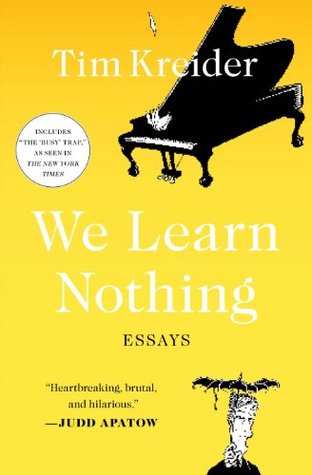More on this book
Community
Kindle Notes & Highlights
by
Tim Kreider
Read between
December 13 - December 16, 2020
My friend Nick used to raise the toast: “Gentlemen—our lives are unbelievably great.”
We may hate each other, but let’s at least quit pretending we hate hating each other; we love hating each other.
(I do know some people who’ve explicitly renegotiated the boundaries and conditions of friendships—saying From now on we don’t talk about my personal life, or Listen, I can’t be your confidante anymore—but these people have all been female. I hesitate to draw any broad generalizations along gender lines, but it feels to me as if it’s a taboo, in male friendships, to talk about the friendship itself.)
It’s funny—we all grow up on a diet of stories about the lone voice of reason trying to warn everyone about some imminent calamity, from Noah to Jor-El, and instinctively side with this hero and despise the ignorant ovine masses who jeer him or try to silence him. And yet whenever such a person appears in real life, our reflex is to join in with the mobs of scoffers and call them alarmists, hysterics, conspiracy freaks, and doomsayers. Nietzsche wrote, “One often contradicts an opinion when it is really only the tone in which it has been presented that is unsympathetic.”8 Or, as The Dude put
...more
Judging from the rote unanimity with which parents preface any gripe about children with the disclaimer “Although I would never wish I hadn’t had them and I can’t imagine life without them,” I can’t help but wonder whether they don’t have to repress precisely this wish on a daily basis.
Hospitals are like the landscapes in recurring dreams: forgotten as though they’d never existed in the interims between visits, but instantly familiar once you return. As if they’ve been there all along, waiting for you while you’ve been away.
We mistakenly imagine we want “happiness,” which we tend to picture in vague, soft-focus terms, when what we really crave is the harderedged quality of intensity.


